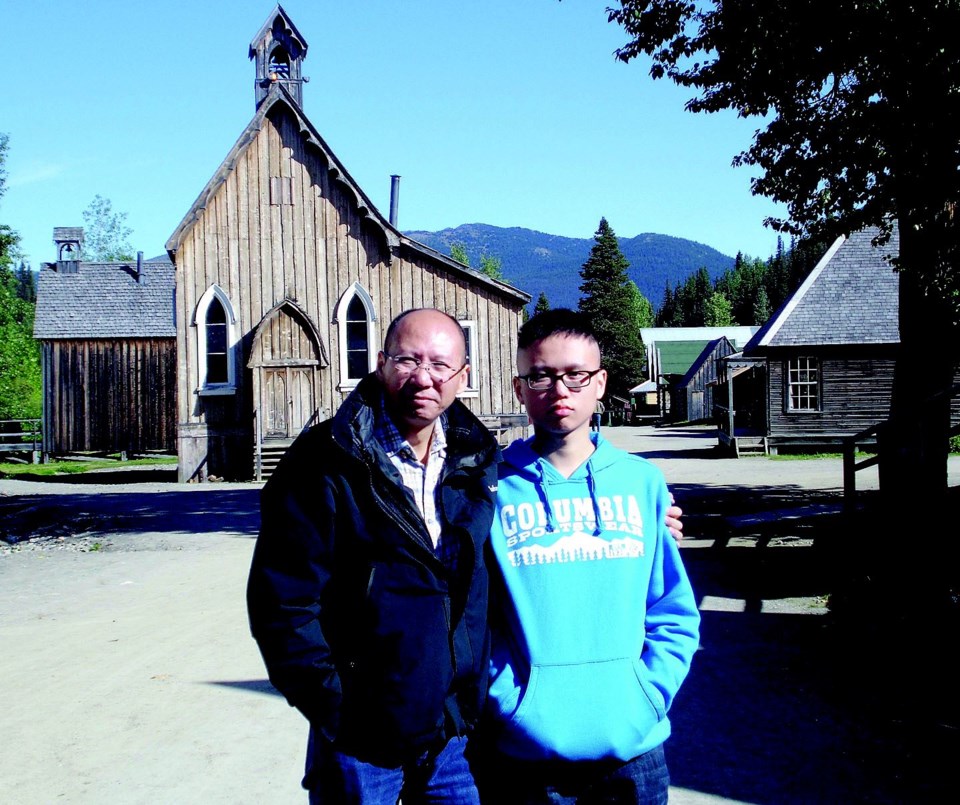Erwin Lee is attending a different high school this year, but this change is a lot more than a simple switch of postal codes.
It's more like going to a different planet.
Until he arrived in the city last week to attend Grade 11 classes at Prince George secondary school, Lee had lived all 16 of his years in Hong Kong -- one of the most densely-packed cities in the world, with eight million people crammed into an area one-third the size of Metro Vancouver.
Webcams, Facebook, texts and emails will keep Erwin, an only child, in contact with his parents, but he admits the changes coming his way are intimidating.
"I was nervous about coming here, and I will miss my friends," said Lee. "I'll also miss boys brigade, I think they are my best friends. They came to the airport when I left and we took a lot of photos.
"I do like the people here. They are very interested in me and what language I speak."
Not only are there a lot less people in Prince George (about 74,000) but there are vast differences in climate, culture, and the Canadian way of life Lee is now experiencing.
For one, his school days at PGSS are shorter than what he's accustomed to. Including lunch and between-class breaks, B.C. school days are six hours long. In Hong Kong, high school students have seven 45-minute classes every school day, and many students, to get ahead, will stay for hours after class to study in the library. It's not uncommon during exam season to see students in their uniforms leave for school at 7 a.m. and return home at 11 at night.
Hong Kong schools are funded by the government based on the marks of their students, and that puts a lot of pressure on the kids to succeed in the classroom. Teachers and principals push the students to get good marks on tests to help their schools achieve a higher rank.
By attending PGSS for his final two years of high school, Lee stands to earn a Dogwood diploma, his ticket to entrance in virtually any college of university in Canada or the United States. Had he finished high school in Hong Kong that likely would not be possible until he completed additional entrance requirements, which would increase the cost.
"It's not so easy to go into university there, only the top 20 or 30 per cent of students who finish high school can go to a university," he said. "There are many many students, so I might not have a chance. Maybe I'd have to work in McDonald's."
Lee's father Jackie and mother Liza wanted Erwin to become more independent and develop his social skills and sought out opportunities for him to study abroad. Sending kids to foreign schools is not unusual for Hong Kong families that can afford the cost. Tuition and other instructional fees paid to the school district are about $9,000 per year, and there are agency fees are on top of that. The Lees already knew about Prince George from a friend in Hong Kong, whose three children were all homestay students at PGSS who lived in the city with their aunt until they graduated. All three are now attending university in Vancouver.
"I believe Canada is a good place for Erwin to study," said Jackie. "I was not considering Toronto or Vancouver but some remote place like Prince George. I didn't want him to have as many distractions which would divert his concentration on studying so I think Prince George is a neat place for him. This is the best way to expose him to a foreign culture so he will become a part of it, where he can learn and see what the outside world is like away from Hong Kong."
Lee is now living with Bev and Greg Primus, who live in a house in the Highland area with their three daughters, aged 18, 16 and 14. Through Prince George-based Shecana International Schools, an agency for international students started 17 years ago by Sheila Hoeg, the Lees found an agent who helped arrange the homestay program and coordinate Erwin's transition to a Canadian school. They submitted medical documents to the Canadian consulate-general in Hong Kong and sent his school records to School District 57's Centre for Learning Alternatives.
"I think we've found a very good homestay family for him," said Jackie. "We were wondering a lot about their background and how they would treat my kid, and actually my wife was worried. But we found [Bev and Greg] are quite responsible, and they treat him like their own kids, which is very appreciated.
"I've seen the foreigners in England, Thailand, Vietnam, all the places that I go, and I would say Prince George people are very easy-going people. Everything seems positive, so I expect a transformation from the original Erwin into the new Erwin after he's exposed to the education, the culture, and his interactions with people."
As a first-year international student whose first language is not English, Erwin attends ESL classes at PGSS and will continue to do so until he reaches a Grade 8-or-higher level of English. There's one other student from Hong Kong, a 14-year-old girl, also attending PGSS. Erwin has heard good things about UNBC and hopes to stay in Prince George to study nursing, but wants to eventually go back to Hong Kong.
He likes the variety of North American food, especially McDonald's, and says he doesn't miss Cantonese cooking.
"He's a strange guy," laughed Jackie. "Everybody likes Chinese food but he doesn't. He's the only one."
Erwin says he's not quite ready for his first Canadian winter. Hong Kong has subtropical climate, where it never snows and frost appears only once or twice a year.
"I need to buy more clothes," he said.



